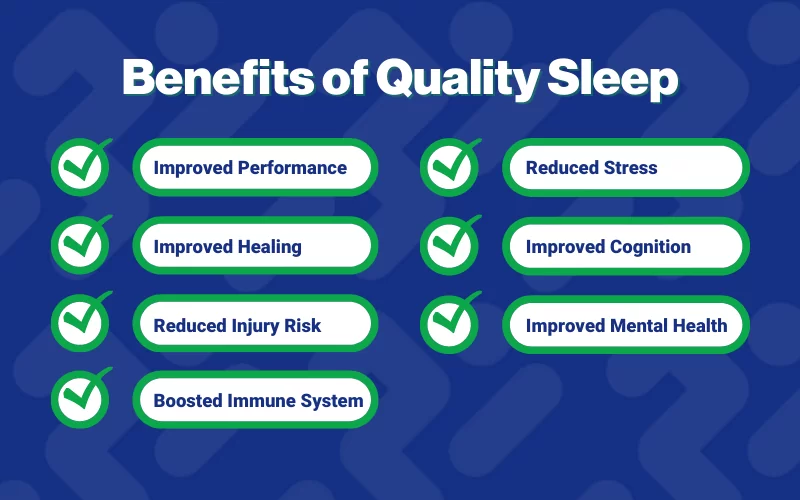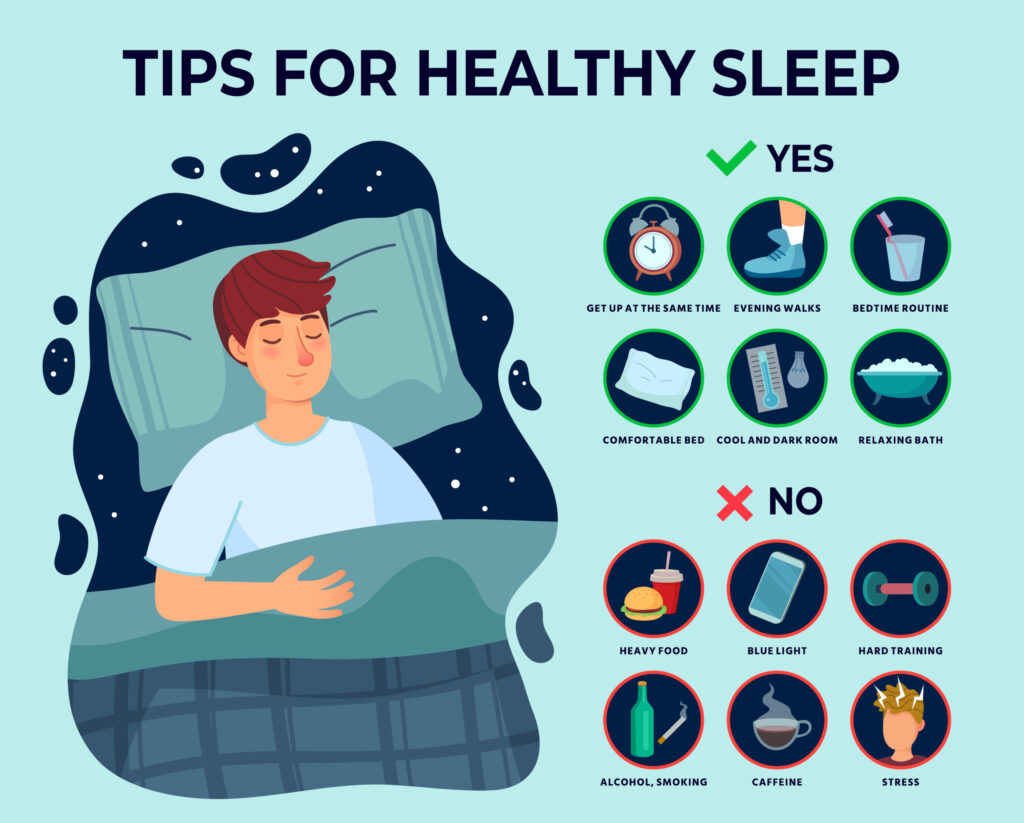
Sleep health refers to the overall quality, duration, and consistency of sleep that supports physical recovery, emotional balance, and cognitive function. Quality sleep strengthens immunity, enhances brain performance, supports heart health, regulates metabolism, and promotes emotional well-being making it a vital foundation for long-term health and productivity.
Key Takeaways
- Deep and REM sleep stages consolidate memory and improve learning capacity.
- Quality sleep strengthens the immune system and reduces inflammation.
- Adequate rest maintains healthy blood pressure and heart function.
- Proper sleep balances hunger hormones and supports healthy weight.
- Restful sleep stabilizes mood, boosts focus, and sharpens decision-making.
- Consistent sleep patterns reduce risks of diabetes, heart disease, and Alzheimer’s.
What is Sleep Health?
cSleep health refers to the overall quality and patterns of sleep that support physical, mental, and emotional well-being. Good sleep health means having consistent sleep duration, timing, and quality that leave you feeling refreshed and alert during the day. It involves more than just getting enough hours of rest; it also includes factors such as a regular sleep schedule, minimal disturbances, and the absence of disorders like insomnia or sleep apnea. Healthy sleep is essential for memory, learning, mood regulation, immune function, and long-term health. Poor sleep habits, on the other hand, increase the risk of chronic diseases.
9 Powerful Sleep Health Benefits
Getting enough good quality sleep is as important as eating healthy and exercising. Recent research shows a growing number of people aren’t sleeping well, affecting energy, mood, memory, and long-term health. Quality sleep is as important for your health as balanced nutrition and regular exercise.

1. Enhances Memory and Learning
During sleep, your brain is hard at work consolidating memories and new information. Deep (slow-wave) and REM sleep stages are especially important for processing what you’ve learned throughout the day. This process, called memory consolidation, strengthens neural connections, making it easier to remember facts, master skills, and even process emotions.
Good sleep is crucial for students, professionals, and anyone seeking to learn or retain information, while sleep deprivation leads to forgetfulness and learning difficulties.
2. Strengthens the Immune System
Your immune system relies on sleep to function at its best. While you rest, the body produces cytokines proteins that target infection and inflammation. Sleep boosts your defenses against illnesses like the common cold and helps you recover more quickly if you do get sick. Chronic sleep deprivation weakens the immune response, making you more susceptible to infections and prolonging recovery times.
3. Supports Heart Health
A healthy sleep routine supports cardiovascular health in multiple ways. While you sleep, your blood pressure and heart rate naturally drop, giving your heart a chance to rest and repair. Ongoing sleep loss keeps blood pressure elevated, putting extra strain on your arteries and heart. Over time, this increases the risk of high blood pressure, heart attacks, stroke, and other cardiovascular diseases.
4. Aids Weight Management and Metabolism
Sleep plays a critical role in regulating hormones that affect hunger and metabolism. Lack of sleep increases ghrelin (hunger hormone) and decreases leptin (fullness hormone), making you feel hungrier and less satisfied after meals. Poor sleep also impairs how your body processes sugar, raising the risk of weight gain and type 2 diabetes. Consistent, quality sleep helps maintain a healthy metabolism and supports weight management efforts.
5. Boosts Mood and Emotional Wellbeing
Quality sleep is foundational for mental health. While you sleep, your brain balances neurotransmitters like serotonin and dopamine, which regulate mood and stress. Insufficient sleep raises irritability, anxiety, and risk for depression. Well-rested individuals tend to feel more positive, resilient, and better able to cope with daily stressors.
6. Improves Focus, Decision-Making, and Productivity
A well-rested brain processes information efficiently, makes better decisions, and maintains attention and alertness. Sleep deprivation reduces cognitive performance, slows reaction times, and increases errors—effects that can rival being under the influence of alcohol. Proper sleep is essential for work, academics, and safe activities like driving.
7. Facilitates Muscle Repair and Physical Recovery
During deep sleep, the body releases growth hormone, which repairs tissues and builds muscle after physical activity. Sleep accelerates recovery from exercise, injuries, and daily physical strain. Athletes especially benefit from good sleep, but everyone needs it for optimal physical repair and reduced risk of injury.
8. Regulates Inflammation
Adequate sleep helps control inflammation by lowering levels of stress hormones such as cortisol. Chronic inflammation is linked to many health problems, including arthritis, diabetes, and heart disease. Poor sleep increases inflammatory markers, putting you at greater risk for chronic illnesses.
9. Reduces Risk of Serious Diseases
Getting enough sleep lowers your risk for chronic conditions like obesity, heart disease, diabetes, stroke, and certain cancers. Sleep also helps the brain clear waste products (such as beta-amyloid), which may reduce the risk of neurodegenerative diseases like Alzheimer’s. In short, consistent quality sleep is a cornerstone of long-term health and longevity.
Practical Tips for Better Sleep
Getting a good night’s sleep is crucial for your physical health, mental sharpness, and overall well-being. Here are some simple, proven strategies to help you sleep better:

- Keep a consistent sleep schedule: Go to bed and wake up at the same time every day, even on weekends.
- Create a sleep-friendly bedroom: Make your room cool, dark, and quiet. Use blackout curtains, eye masks, or white noise if needed.
- Limit screen time before bed: Avoid phones, tablets, computers, and TVs at least an hour before sleep to prevent blue light from interfering with melatonin production.
- Avoid caffeine and heavy meals late in the day: Stop caffeine by mid-afternoon and finish large meals 2–3 hours before bedtime.
- Exercise regularly but not right before bed: Daily activity helps sleep, but intense workouts late in the evening can make it harder to fall asleep.
- Get natural light exposure in the morning: Sunlight in the morning helps reset your internal clock for better sleep at night.
- Establish a relaxing pre-bed routine: Wind down with calming activities, such as reading, light stretching, or meditation, before sleep.
- Use your bed only for sleep and intimacy: Don’t work, watch TV, or eat in bed to strengthen the association between your bed and sleep.
- Manage stress and worry: Try deep breathing, mindfulness, or journaling to calm your mind before bedtime.
- If you can’t sleep, get out of bed: If you’re unable to fall asleep after 20 minutes, leave the bedroom and do a quiet activity in dim light until you feel sleepy.
Impact of Sleep on Health & Well-being
Quality sleep is essential for maintaining and optimizing multiple vital systems in the body. Sleep affects immunity, mental health, cognitive function, and cardiometabolic health in distinct but interconnected ways.
1. Immunity
Sleep plays a critical role in strengthening the immune system. During sleep, the body produces and releases cytokines proteins that help fight infection and inflammation. Adequate sleep improves the body’s ability to respond to pathogens such as viruses and bacteria.
- Research Evidence: A 2020 clinical study showed individuals who slept fewer than 6 hours were significantly more likely to catch the common cold after exposure compared to those getting 7 or more hours.
- Sleep restores immune memory, improving how the body remembers and attacks previously encountered microbes.
- Poor or insufficient sleep suppresses immune function, leading to higher susceptibility to infections and slower recovery.
2. Mental Health
Good sleep is closely linked to emotional resilience and mental well-being.
- People with consistent, high-quality sleep report fewer symptoms of anxiety and depression.
- Sleep, particularly REM stages, supports emotional regulation by processing stress and traumatic memories.
- Disrupted sleep can increase emotional reactivity, worsen mood disorders, and is a risk factor for developing psychiatric conditions.
- The Lancet Psychiatry (2022) review confirmed that improving sleep can reduce symptoms of depression and anxiety, serving as a potential therapeutic target.
3. Memory and Cognitive Function
Deep sleep stages (mostly slow-wave sleep, NREM stage 3) are critical for memory consolidation, the process where the brain transfers short-term memories into stable long-term storage.
- During deep sleep, the brain clears out metabolic waste products facilitating neuroplasticity (brain cell communication).
- Lack of deep sleep is linked to impaired learning, concentration, and decision-making.
- REM sleep also plays a role in integrating emotional and procedural memories (like skills).
4. Heart and Metabolic Health
Poor or insufficient sleep disrupts multiple metabolic processes:
- Sleep deprivation affects hormone balance, increasing cortisol and altering appetite-regulating hormones (ghrelin increases hunger, leptin decreases satiety), contributing to weight gain.
- It also raises blood pressure, promotes inflammation, and impairs glucose metabolism, increasing the risk of insulin resistance and type 2 diabetes.
- Chronic inadequate sleep is a significant risk factor for cardiovascular diseases, including hypertension, coronary artery disease, and stroke.
- A 2023 meta-analysis confirmed that adults sleeping less than 6 hours per night have a 20–30% higher risk of cardiovascular events.
Conclusion
Quality sleep is fundamental for both mental and physical health. It not only enhances memory and learning by consolidating new information during deep and REM sleep, but also strengthens immunity, supports heart health, and helps regulate appetite and metabolism.
Good sleep stabilizes mood, sharpens focus, and increases productivity, while also promoting muscle repair and controlling inflammation. Importantly, regular, restful sleep reduces the risk of serious diseases like diabetes, heart disease, stroke, and Alzheimer’s.
Many people overlook the value of sleep, but its benefits rival those of proper nutrition and exercise. Prioritizing quality sleep through healthy habits such as maintaining a consistent schedule, limiting screen time before bed, creating a calm sleep environment, and managing stress can transform your well-being. Ultimately, making sleep a priority leads to sharper thinking, better mood, stronger immunity, and improved long-term health, making it an essential pillar for a thriving life.
FAQs
Why is quality sleep important for memory and learning?
Quality sleep, especially deep and REM stages, helps consolidate memories and improve retention of information.
How does sleep strengthen the immune system?
During sleep, the body produces cytokines that fight infections and inflammation, boosting immunity.
What impact does sleep have on heart health?
Healthy sleep lowers blood pressure and allows the heart to rest, reducing risks of hypertension, heart attacks, and strokes.
How does sleep affect weight management?
Sleep regulates hunger hormones ghrelin and leptin; poor sleep increases hunger and risk of weight gain and diabetes.
Can sleep influence mood and emotional wellbeing?
Yes, it stabilizes neurotransmitters like serotonin and dopamine, reducing stress and mood disorders.
Why does lack of sleep reduce focus and productivity?
Sleep deprivation slows brain processing, impairs decision-making, and increases errors, similar to alcohol effects.
How does sleep assist muscle repair?
Growth hormone released during deep sleep aids tissue repair and muscle recovery.
What is the relationship between sleep and inflammation?
Adequate sleep lowers stress hormones, reducing chronic inflammation linked to many diseases.
How does sleep reduce the risk of serious diseases?
Sleep deprivation is associated with higher risks of obesity, diabetes, heart disease, stroke, cancer, and Alzheimer’s.
How much sleep do adults need for optimal health?
Most adults need 7–9 hours of quality, uninterrupted sleep nightly for best mind and body function.
Reference
- Centers for Disease Control and Prevention (CDC)
Learn about the importance of sleep for health and wellbeing:
https://www.cdc.gov/sleep/about_index.html - U.S. National Institutes of Health (NIH)
Information on how sleep affects brain function and overall health:
https://www.ninds.nih.gov/health-information/public-education/brain-basics/brain-basics-understanding-sleep - Sleep Foundation
Detailed benefits of sleep and explanations of sleep stages:
https://www.sleepfoundation.org/how-sleep-works/benefits-of-sleep - Harvard Division of Sleep Medicine
Research on sleep’s role in health, memory, and longevity:
https://sleep.med.harvard.edu/health-adults - Healthline
Science-backed reasons why good sleep matters:
https://www.healthline.com/nutrition/10-reasons-why-good-sleep-is-important
Dr. Lazaro Burnett is a board-certified internist with 12 years in primary and preventive care. He holds an MD from the University of Michigan Medical School (2013) and an MPH in Epidemiology from Johns Hopkins Bloomberg School of Public Health (2017). His focus is nutrient deficiencies, drug–supplement interactions, and chronic disease risk reduction. He has served at Kaiser Permanente Northern California and contributed to care pathway reviews for internal medicine departments. Verify board status via ABIM listing, publications (e.g., PubMed/Google Scholar), and NPI.

